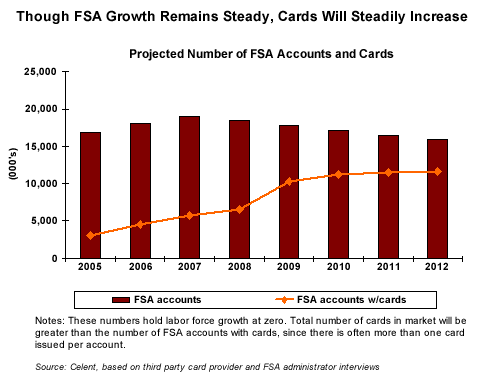Flexible Spending Accounts, Flexible Cards?
Abstract
? An Examination of Prepaid Cards in the Health Care FSA Market
In a new report, , Celent explores how debit cards for flexible spending accounts (FSAs) are transforming the flexible spending account market. Adoption of FSAs has been stymied by logistics, bureaucratic red tape, and regulation. But thanks to recent regulation that paved the way for FSA cards, the industry is no longer stilted by the inefficiencies of the previously paper based system.
Before FSA cards employees effectively paid for FSA-qualified services or goods twice. First, money was taken out of their paycheck and then they had to pay again at the point of purchase. The main road block was there was no way to take money directly from their FSA account when paying for the good or service. But FSA debit cards address this issue and decrease many of the other burdens associated with FSA accounts.
"FSA cards are beginning to revive the FSA market and draw positive attention from employees and employers," says Ariana-Michele Moore, author of the report. "However, obtaining the data necessary for substantiating expenses is not always easy, and the industry has had to overcome this hurdle as well as educate employees when they can and cannot use their debit cards. But various tactics have been taken to address both issues."
The market does face challenges, including substantiating claims and customer education. And other products such as HRAs and HSAs will eventually compete for market share. But despite these obstacles the flexibility debit cards bring to the FSA program will continue to stimulate the FSA market.
Today, there are approximately 6 million debit cards in the market tied to an FSA account, 25% of the FSA participating community. And the near-term outlook for FSA cards is certainly bright. FSA cards will increase FSA adoption rates. Today the average card participation rate is around 20%. By 2010, it is projected this rate will increase to 85%. FSA cards will also encourage higher FSA contribution levels. According to some FSA administrators, the introduction of a debit cards can encourage employees to contribute as much as 30% more.
This report offers an overview of these cards, industry challenges, how these challenges are being addressed, and the market opportunity. The report concludes with insight into future FSA debit card trends and the role they will play going forward in FSAs.
The 30-page report contains 10 figures and 2 tables.
A table of contents is available online.

